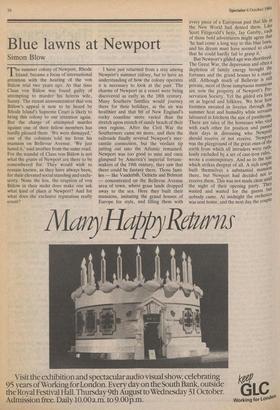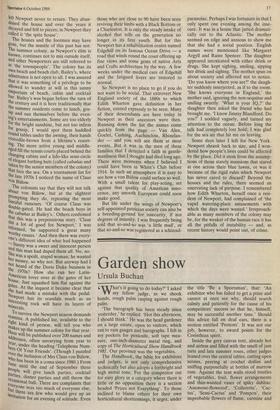Blue lawns at Newport
Simon Blow
rr he summer colony of Newport, Rhode Island, became a focus of international attention with the hearing of the von Billow trial two years ago. At that time Claus von Billow was found guilty of attempting to murder his heiress wife, Sunny. The recent announcement that von Billow's appeal is now to be heard by Rhode Island's Supreme Court is likely to bring this colony to our attention again. But the charge of attempted murder against one of their fellow members has hardly pleased them. 'We were dismayed,' one of the colonists told me from his mansion on Bellevue Avenue. 'We just hated it,' said another from the same road. For the scandal of Claus von Biilow is not what the gratin of Newport are there to be remembered for. They would wish to remain known, as they have always been, for their elevated social standing and exclu- sivity. None the less, the eruption of von Billow in their midst does make one ask what kind of place is Newport? And for what does .the exclusive reputation really count? I have just returned from a stay among Newport's summer colony, but to have an understanding of how the colony operates it is necessary to look at the past. The charms of Newport as a resort were being discovered as early as the 18th century. Many Southern families would journey there for their holidays, as the air was healthier and that bit of New England's rocky coastline more varied than the stretch upon stretch of sandy beach of their own regions. After the Civil War the Southerners came no more, and then the railroads finally severed Newport's mer- cantile connection, but the verdant tip jutting out into the Atlantic remained. Newport was too good to miss and once glimpsed by America's imperial fortune- makers of the 19th century, they saw that there could be fantasy there. Those fami- lies — like Vanderbilt, Oelrichs and Belmont — concentrated on the Bellevue Avenue area of town, where grass lands dropped away to the sea. Here they built their mansions, imitating the grand houses of Europe for style, and filling them with
every piece of a European past that life in the New World had denied them. Like Scott Fitzgerald's hero, Jay Gatsby, each of those bold adventurers might agree that 'he had come a long way to this blue lawn, and his dream must have seemed so close that he could hardly fail to grasp it.' But Newport's gilded age was shortlived. The Great War, the depression and often a depletion of family energy brought the fortunes and the grand houses to a stand: still. Although much of Bellevue is still private, most of those sumptuous mansions are now the property of Newport's Pre- servation Society. Yet the gilded era lives on as legend and folklore. We hear how footmen sweated in liveries through the summer heat and humidity while servants laboured in kitchens the size of pantheons. There are tales of the hostesses who vied with each other for position and passed their days in discussing who NewPort should receive or not receive. 'Newport was the playground of the great ones of the earth from which all intruders were ruth-, lessly excluded by a set of cast-iron rules, wrote a contemporary. And so to the tale which strikes deepest of all. A rich couple built themselves a substantial mansion there, but Newport had decided not to. receive them. This was not made clear until the night of their opening party. The)/ waited and waited for the guests hut nobody came. At midnight the orchestra was sent home, and the next day the couple
left Newport never to return. They aban- doned the house and over the years It decayed and fell to pieces; in Newport they called it 'the spite house'.
The houses and the footmen may have gone, but the mantle of this past has not. The summer colony, as Newport's elite is known, continues not to mix outside itself, and other Newporters are still referred to as 'the townspeople'. The colony has its own beach and beach club, Bailey's, where admittance is not open to all. I was assured that it was something of a privilege to be allowed to wander at will in this sunny emporium of beach, cabin and cocktail bar. Bailey's was begun before the turn of the century and it is here traditionally that the summer residents come to lunch, gos- ip and sun themselves before the even- mg's entertainments. Some are too elderly for the bright sunshine, but not too infirm for gossip; I would spot them huddled round tables under the awning, their hands crocodile brownfrom a lifetime's resort- ing- The more active young and middle- aged fill the tennis courts placed behind the changing cabins and a lido-like semi-circle Of elegant bathing huts (called cabanas and taken by the senior members of the colony) that face the sea. On a tournament list for the late 1970s I noticed the name of Claus Von Billow. The colonists say that they will not talk about von Billow, but at the slightest Prompting they do, repeating the most fanciful rumours. 'Of course Claus was double-gated. He had the beach boys in the cabanas at Bailey's.' Others confirmed that this was a preposterous story. 'Claus d. Id a lot of good for Newport,' I was informed, 'he supported a great many Worthy causes.' And then there was every- cme's different idea of what had happened Sunny was a sweet and innocent person and this man had duped them all. No, no. her Was a spoilt, stupid woman; he wanted "er money, so why not. But anyway had I not heard of the Doris Duke business in the 1970s? How she ran her Latin- American lover over at the gates of her Rouse. Just squashed him flat against the gates. At the inquest it became clear that she had made a mistake with the pedal. .INewport has its scandals much as an Interesting rock will have its layers of Minerals. To survive the Newport season demands stamina. A published list, available to the rtght kind of person, will tell you who makes up the summer colony for that year. Here will be published over 200 names and addresses, often unvarying from year to i;ear, under the heading 'Telephone Num- ers Of Your Friends'. (Though I puzzled Over the inclusion of Mrs Claus von Billow, Who has been in a coma since 1980.) From June until the end of September these People will give lunch parties, cocktail Parties, dinner parties and still throw the occasional ball. There are complaints that ,"eryone sees too much of everyone else, Out there are few who would give up an Invitation for an evening of solitude. Even
those who are close to 90 have been seen reviving their limbs with a Black Bottom or a Charleston. It is only the steady intake of alcohol that tells on the generation no longer in its first youth. But for this Newport has a rehabilitation centre named Edgehill on its famous Ocean Drive — a road that winds round the coast offering up fine views and some gems of native Arts and Crafts architecture by the way. A few weeks under the medical care of Edgehill and the fatigued livers are restored to normal.
So Newport is no place to go if you do not want to be social. That extrovert New England society of the 1880s to which Edith Wharton gave definition in her fiction, existed expressly to be seen. Many of their descendants are here today in Newport as their ancestors were then. Running down the list the names come quickly from the page — Van Alen, Goelet, Cushing, Auchincloss, Rhinelan- der — and you will see them at most events. But it was in the men of these families that I detected a faith in gentle- manliness that I thought had died long ago. There were moments when I believed I could have been in White's Club before 1914. In such an atmosphere it is easy to see how a von Billow could surface so well. With a small talent for play-acting, set against that quality of American inno- cence, any smooth European could soon make good.
But life under the wings of Newport's self-appointed patrician society can also be a breeding-ground for insecurity, if not degrees of insanity. I was frequently being told that so-and-so was 'a little mad', or that so-and-so was registered as a schizoid- paranoiac. Perhaps I was fortunate in that I only spent one evening among the inse- cure. It was in a house that jutted dramati- cally out to the Atlantic. The mother seemed on edge and anxious to show me that she had a social position. English names were mentioned like Margaret Argyll and Raine Spencer. The daughter appeared intoxicated with either drink or drugs. She kept sighing, smiling, sipping her drink and sighing. The mother spun on about society and affected not to notice. 'Do you know where you are?' the daugh- ter suddenly interjected, as if to the room. 'She knows everyone in England,' the mother said, ignoring the non-sequitur and smiling sweetly. 'What is your IQ,?' the daughter then asked the friend who had brought me. 'I know Jimmy Blandford. Do you?' I nodded vaguely, and turned my attention to the ocean. Before long the talk had completely lost hold; I was glad for the sea air that hit me on leaving.
Some days later I left for New York. Newport shrank back to size, and I won- dered how people's lives could be affected by the place. Did it stem from the assump- tions of those stately mansions that stared at one across their blue lawns, or was it because of the rigid rules which Newport has never cared to discard? Beyond the houses and the rules, there seemed an enervating lack of purpose. I remembered how Edith Wharton, herself once a resi- dent of Newport, had complained of 'the vapid watering-place amusements with which the days were wasted.' Irreproach- able as many members of the colony may be, for the weaker of the human race it has all the pitfalls of instability — and, as recent history would point out, of crime.















































 Previous page
Previous page